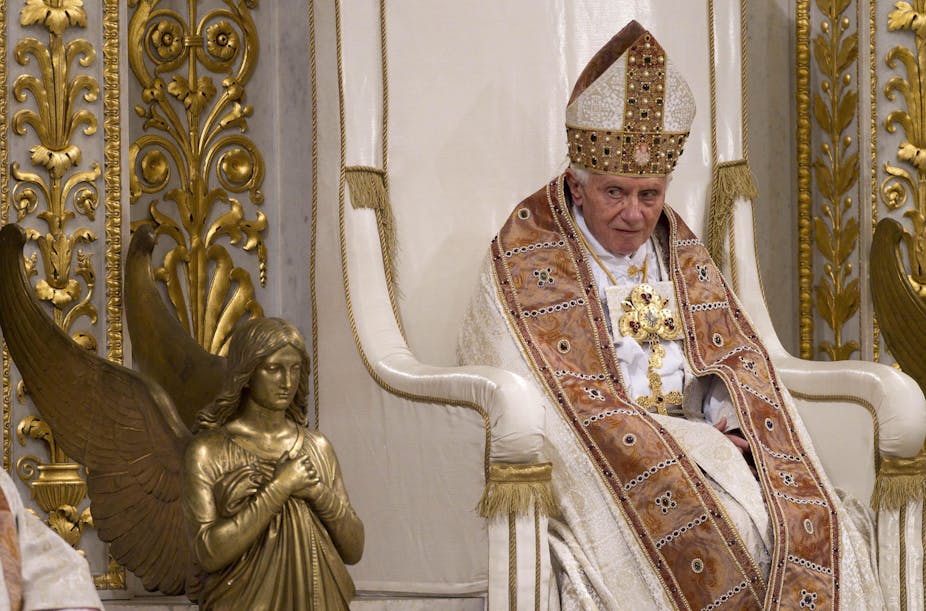Pope Benedict XVI announced his historic decision to step aside as Pope yesterday. This is the first time in 600 years a Pope has resigned. And in 1415 when Gregory XII resigned, he did so not to retire, but in order that, after decades of schism, the church might once again have a single Pope.
At 85, Benedict is one of the oldest Popes in the church’s 2000-year history. His predecessor John Paul II was 84 when he died. This is arguably the first time that a Pope has resigned on account of the infirmity which accompanies old age.
The English version of his announcement states:
After having repeatedly examined my conscience before God, I have come to the certainty that my strengths, due to an advanced age, are no longer suited to an adequate exercise of the Petrine ministry.
This statement brings to public attention the mortality and fragility of the human person who occupies the office of Pope, who is charged by the church with exercising “the Petrine ministry”.
The ministry is demanding, because the Pope wields an extraordinary degree of authority and responsibility largely unknown in modern societies. Contrary to popular belief, the Pope is not himself infallible, although he does have the power to make infallible statements.
In stepping aside, Benedict - or Cardinal Joseph Ratzinger, as he will soon be known - has shown self awareness of his physical weakness, such that he considers he is no longer capable of exercising the powers and responsibilities with which he is charged. His statement continues:
In today’s world, subject to so many rapid changes and shaken by questions of deep relevance for the life of faith, in order to govern the barque of Saint Peter and proclaim the Gospel, both strength of mind and body are necessary, strength which in the last few months, has deteriorated in me to the extent that I have had to recognise my incapacity to adequately fulfil the ministry entrusted to me.
This public acknowledgement of papal frailty is all the more intriguing because of the church’s reputation. The scandalous revelations around the sexual abuse of children by priests and religious figures, and the way perpetrators have been protected, has led to intense criticism of the way in which the church has exercised power. At the heart of this criticism is the accusation that the Catholic Church is more protective of its standing as an institution, of the reputation of its bishops and clergy, than it is of the humans it serves. The resignation of an individual as Pope is a dramatic reminder of the frailty of all humans, and the consonant weakness of institutions and offices.

There is a further, theological dimension to this unexpected resignation. Catholic teaching has often been perceived by many to be at odds with contemporary morals, especially in areas such as contraception, assisted reproduction, or abortion, practices that draw attention to the question of when life begins.
Catholic theology has long prided itself, however, on bringing together understanding of the nature of life - its beginning and its ending - with the concept of human dignity. It is this concern which has driven Catholic engagement in health, welfare, education and social justice, not least in aged care.
In the 21st century, when the health sciences have evolved to a point where humans with assured access to food, water and shelter can live longer than in any previous century, a theology of ageing has become more important than ever before.
Benedict’s resignation will draw attention to this development as no other event could. What happens when humans live to great ages, yet still confront deterioration in “both strength of mind and body”? This is a question that preoccupies ageing people and their carers, wherever frail health, dementia, or other conditions impair familiar mental and physical capacities.
Is there room in church and society for a theology of ageing which supports and enables human dignity for the aged, especially where mind and body are frail?
Recent research by Dr Stephen Ames on behalf of the Australian Anglican agency Benetas has highlighted the perception that with ageing, “one’s very self dissolves”. Ames writes:
If it is assumed that worth and personhood is defined in functional terms, then, as functionality unravels, so does the sense of personhood and worth … [but] Theology rejoices that personhood is not lost as we age.
Benedict’s resignation is a potent reminder that even the Pope is fallible, frail, and mortal. As his legacy is reviewed, and as speculation mounts about his successor, it is worth contemplating what his resignation might reveal about life in an ageing world.

